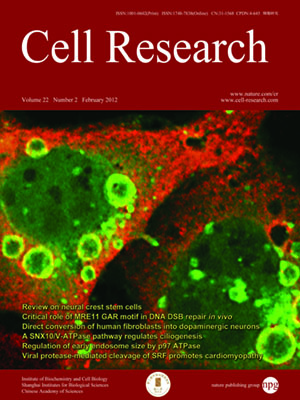
Volume 22, No 2, Feb 2012
ISSN: 1001-0602
EISSN: 1748-7838 2018
impact factor 17.848*
(Clarivate Analytics, 2019)
Volume 22 Issue 2, February 2012: 413-424
ORIGINAL ARTICLES
Isolation and proteomic analysis of the SYP61 compartment reveal its role in exocytic trafficking in Arabidopsis
Georgia Drakakaki1,6, Wilhelmina van de Ven1, Songqin Pan1, Yansong Miao2,7, Junqi Wang2, Nana K Keinath3, Brent Weatherly4,5, Liwen Jiang2, Karin Schumacher
1Department of Botany and Plant Sciences, Center for Plant Cell Biology, Institute for Integrative Genome Biology, 4119C Genomics Building, University of California Riverside, CA 92521, USA
2School of Life Sciences, Center for Cell and Developmental Biology, Chinese University of Hong Kong, New Territories, Hong Kong, China
3Heidelberg Institute for Plant Science, Im Neuenheimer Feld 230, Heidelberg 69120, Germany
4Complex Carbohydrate Research Center, University of Georgia, Athens, GA 30602, USA
5NuSep Inc., Bogart, GA 30622, USA
6Current address: Department of Plant Sciences, University of California, Davis, CA 95616, USA
7Current address: Department of Molecular and Cell Biology, University of California, Berkeley, CA 94720, USA
Correspondence: Natasha Raikhel,(nraikhel@ucr.edu)
The endomembrane system is a complex and dynamic intracellular trafficking network. It is very challenging to track individual vesicles and their cargos in real time; however, affinity purification allows vesicles to be isolated in their natural state so that their constituent proteins can be identified. Pioneering this approach in plants, we isolated the SYP61
trans-Golgi network compartment and carried out a comprehensive proteomic analysis of its contents with only minimal interference from other organelles. The proteome of SYP61 revealed the association of proteins of unknown function that have previously not been ascribed to this compartment. We identified a complete SYP61 SNARE complex, including regulatory proteins and validated the proteome data by showing that several of these proteins associated with SYP61
in planta. We further identified the SYP121-complex and cellulose synthases, suggesting that SYP61 plays a role in the exocytic trafficking and the transport of cell wall components to the plasma membrane. The presence of proteins of unknown function in the SYP61 proteome including ECHIDNA offers the opportunity to identify novel trafficking components and cargos. The affinity purification of plant vesicles in their natural state provides a basis for further analysis and dissection of complex endomembrane networks. The approach is widely applicable and can afford the study of several vesicle populations in plants, which can be compared with the SYP61 vesicle proteome.
Cell Research (2012) 22:413-424. doi:10.1038/cr.2011.129; published online 9 August 2011
FULL TEXT | PDF
Browse 2270


